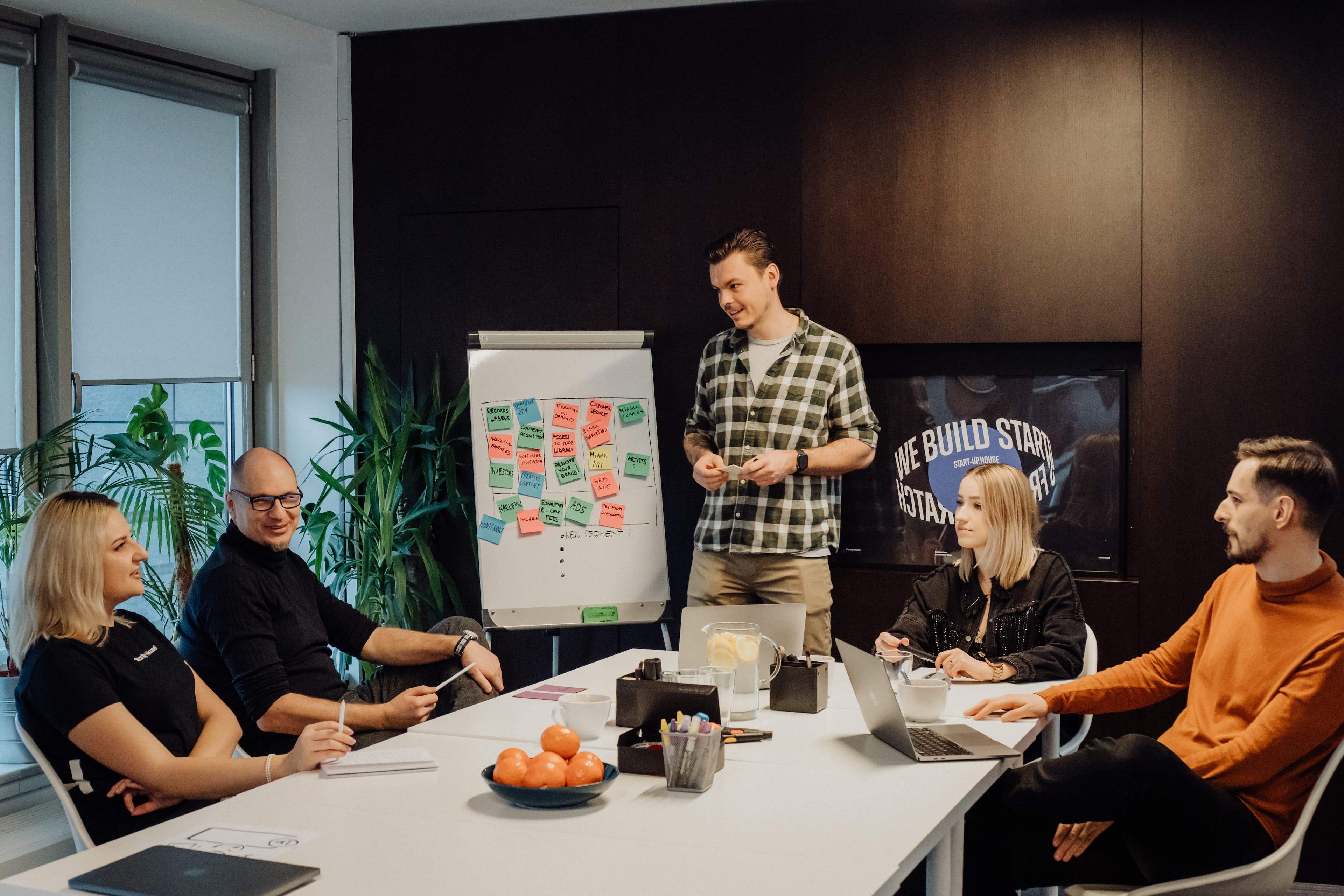Top Traits of an Outstanding Software Development Team
Alexander Stasiak
Apr 18, 2025・12 min read
Table of Content
Effective Communication
Clarity and Precision
Active Listening Skills
Regular Feedback
Adaptability and Flexibility
Embracing Change
Handling Uncertainty
Technical Proficiency
Mastery of Tools and Languages
Problem-Solving Skills
Collaborative Spirit
Teamwork and Cooperation
Conflict Resolution
Commitment to Quality
Attention to Detail
Continuous Improvement
In the fast-paced world of technology, the success of a software project often hinges on the team behind it. Assembling an outstanding software development team requires more than just technical skills; it demands a combination of qualities that facilitate effective collaboration and innovation. These traits define the difference between a good team and a truly exceptional one. In this discussion, we will delve into the key characteristics that make a software development team stand out, offering insights into how these attributes contribute to the creation of high-quality software solutions. Whether you are looking to build or join such a team, understanding these traits will be invaluable.
Effective Communication
Clarity and Precision
In a software development team, clarity and precision are crucial aspects of effective communication. Clear communication ensures that everyone understands the project's objectives, their roles, and the tasks at hand. It minimises misunderstandings and reduces the likelihood of errors, thus enhancing the team's efficiency. Precision involves using specific language to convey ideas, requirements, or feedback, leaving no room for ambiguity. This is particularly important when dealing with complex technical details, where vague instructions can lead to costly mistakes. Encouraging a culture of asking questions and confirming understanding can further bolster clarity. Additionally, written documentation should be maintained to provide a reference point for all team members. By prioritising clarity and precision, a software development team can align its efforts more effectively, ultimately delivering projects that meet or exceed expectations.
Active Listening Skills
Active listening is a vital component of effective communication within a software development team. It goes beyond merely hearing the words being spoken; it involves fully engaging with the speaker and comprehending their message. This skill fosters an environment where team members feel valued and understood, which can enhance collaboration and trust. Active listening requires focusing on the speaker, acknowledging their points, and providing thoughtful feedback. It helps in identifying potential issues early on and understanding diverse perspectives, which can lead to more innovative solutions. Practising active listening can also reduce conflict, as it allows for clearer communication and the ability to address concerns before they escalate. In team meetings or discussions, encouraging active listening ensures that all voices are heard and considered, leading to better decision-making and a more cohesive team dynamic. By mastering this skill, software development teams can significantly improve their overall effectiveness.
Regular Feedback
Regular feedback is an essential aspect of effective communication in a software development team. It provides an opportunity for team members to reflect on their performance, address any challenges, and celebrate successes. Timely feedback helps individuals and the team as a whole to adjust their approach, ensuring that the project remains on track. Constructive feedback should be specific, focusing on behaviours and outcomes rather than personal attributes. This approach helps to foster a culture of continuous improvement and learning. Feedback can be delivered through formal reviews, one-on-one meetings, or informal discussions, and it should be a two-way street, allowing for dialogue and mutual understanding. Moreover, positive feedback should not be overlooked, as it reinforces good practices and boosts morale. By implementing a structured feedback process, software development teams can enhance collaboration, address issues promptly, and maintain high standards, ultimately contributing to the successful delivery of projects.
Adaptability and Flexibility
Embracing Change
In the realm of software development, embracing change is a crucial trait that enables teams to remain competitive and innovative. The technology landscape is ever-evolving, and project requirements can shift rapidly due to market demands or client feedback. A team that is adaptable and open to change is more likely to thrive under such conditions. Embracing change means being willing to pivot strategies, adopt new tools, or revise codebases as necessary. It involves viewing change not as a hindrance, but as an opportunity to improve and innovate. Promoting a mindset that welcomes change encourages team members to experiment and learn from new experiences. Regularly updating skills and staying informed about industry trends can also prepare teams to handle changes more effectively. By fostering an environment where change is seen as a natural and beneficial part of the development process, teams can ensure they deliver robust and relevant software solutions.
Handling Uncertainty
Handling uncertainty is a critical aspect of adaptability and flexibility in software development. Projects often encounter unforeseen challenges or shifts in priorities, and the ability to navigate these uncertainties can determine a team's success. Team members must be comfortable with ambiguity and possess the skill to make decisions without having every detail. This involves assessing risks, weighing potential outcomes, and choosing the best course of action amidst incomplete information. Encouraging open communication and collaboration can aid in managing uncertainty, as diverse perspectives can offer innovative solutions to complex problems. Additionally, adopting agile methodologies, which emphasise iterative progress and responsiveness to change, can provide a structured approach to dealing with uncertainty. By building resilience and fostering a proactive attitude towards unforeseen events, teams can maintain momentum and continue delivering high-quality software. This ability not only ensures project continuity but also enhances the team's capability to innovate and excel in the face of unpredictability.
Technical Proficiency
Mastery of Tools and Languages
Mastery of tools and languages is a cornerstone of technical proficiency in a software development team. Proficient use of the right programming languages and development tools can significantly enhance productivity and the quality of the software produced. It requires a deep understanding of the languages and technologies most relevant to the project's needs, whether it's Python for data analysis, JavaScript for web development, or C++ for system applications. Additionally, familiarity with integrated development environments (IDEs), version control systems like Git, and other collaborative tools is essential. This expertise allows developers to write cleaner, more efficient code, troubleshoot issues swiftly, and implement features effectively. Continuous learning and professional development are also key, as they help team members stay up-to-date with the latest tools and industry best practices. By mastering the necessary tools and languages, teams can ensure they deliver robust and scalable software solutions that meet modern standards.
Problem-Solving Skills
Problem-solving skills are a fundamental aspect of technical proficiency in software development. Developers frequently encounter complex issues and bugs that require innovative solutions. Effective problem-solving involves a methodical approach: identifying the root cause, analysing potential solutions, and implementing the most viable fix. This process often requires creativity, logical thinking, and attention to detail. Additionally, strong problem-solving skills enable developers to foresee potential issues during the design phase, thus preventing costly errors later on. Collaboration among team members can further enhance problem-solving capabilities, as diverse perspectives can lead to more comprehensive solutions. Practising coding challenges, participating in hackathons, and learning from real-world scenarios can help sharpen these skills. By fostering a culture that encourages experimentation and learning from failures, teams can enhance their problem-solving prowess. Ultimately, strong problem-solving skills contribute to the creation of robust, efficient, and reliable software, ensuring project success and client satisfaction.
Collaborative Spirit
Teamwork and Cooperation
Teamwork and cooperation are the bedrock of a collaborative spirit within a software development team. The ability to work effectively with others towards a common goal is essential for producing high-quality software. Teamwork involves recognising and leveraging each member's strengths, ensuring that tasks are allocated in a way that maximises efficiency and effectiveness. Cooperative teams are characterised by open communication, mutual respect, and a willingness to share knowledge and skills. This environment encourages team members to support one another, fostering a sense of camaraderie and shared responsibility. Regular team meetings, collaborative tools, and clear communication channels can facilitate smoother cooperation. Furthermore, celebrating team achievements and providing opportunities for social interaction can strengthen team bonds. By nurturing a culture of teamwork and cooperation, software development teams can enhance creativity, improve problem-solving, and achieve better project outcomes, ensuring they meet deadlines and exceed expectations.
Conflict Resolution
Conflict resolution is a key component of maintaining a collaborative spirit in a software development team. Conflicts, arising from differing opinions or misunderstandings, are almost inevitable in any team setting. However, how these conflicts are managed can significantly impact team dynamics and productivity. Effective conflict resolution involves addressing issues promptly and constructively, ensuring that all parties feel heard and understood. This may require mediation by a team leader or an impartial third party to facilitate open dialogue. It's important to focus on the issue at hand rather than personal differences, aiming for a resolution that aligns with the team's goals. Encouraging a culture of respect and empathy can prevent conflicts from escalating. Additionally, clear communication and setting shared objectives can mitigate potential disagreements. By implementing strategies for effective conflict resolution, teams can maintain a positive working environment, fostering collaboration and creativity while ensuring the successful delivery of projects.
Commitment to Quality
Attention to Detail
Attention to detail is a critical trait for ensuring a commitment to quality in software development. It involves meticulously reviewing code, design, and requirements to identify and rectify errors or inconsistencies before they become problematic. This vigilance is essential for producing software that meets high standards of functionality, performance, and user experience. Developers with a keen eye for detail can spot potential issues during the initial stages, preventing them from escalating into significant problems later. This trait also encompasses the ability to follow coding standards and best practices, contributing to the maintainability and scalability of the codebase. Encouraging thorough code reviews, comprehensive testing, and precise documentation can help instil attention to detail within a team. By prioritising this trait, software development teams can ensure that the final product is reliable and robust, ultimately enhancing customer satisfaction and trust in the software's quality.
Continuous Improvement
Continuous improvement is a fundamental aspect of maintaining a commitment to quality in software development. It involves an ongoing effort to enhance processes, products, and skills to deliver superior software solutions. This commitment requires a proactive approach to identifying areas for enhancement, whether through regular retrospectives, feedback loops, or performance evaluations. Encouraging team members to pursue professional development and stay informed about the latest industry trends and technologies is vital. Implementing agile methodologies can facilitate continuous improvement by promoting iterative development and frequent reassessment of goals and outcomes. Embracing a mindset of learning from failures and celebrating small wins can motivate the team to strive for excellence. By fostering a culture of continuous improvement, software development teams can adapt to changing requirements, increase efficiency, and boost innovation, ultimately ensuring that they consistently deliver high-quality products that meet or exceed client expectations.
Digital Transformation Strategy for Siemens Finance
Cloud-based platform for Siemens Financial Services in Poland


You may also like...

Financial services software development
Building software for financial services is no small feat. From strict compliance rules to data security and scalability, every stage matters.
Alexander Stasiak
Nov 04, 2025・12 min read

Choosing the Right Software Development Partner: A Practical Guide for Startups
The right software development partner can define your startup’s success. This guide shows how to choose one that fits your goals and needs.
Alexander Stasiak
Dec 30, 2024・10 min read

Understanding Event-Driven Programming: A Simple Guide for Everyone
Explore the essentials of event-driven programming. Learn how this responsive paradigm powers interactive applications with real-world examples and key concepts.
Marek Pałys
Apr 30, 2024・9 min read




